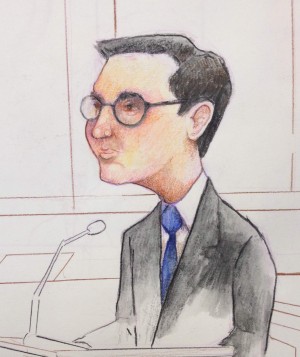
Former Massey Energy CEO Don Blankenship repeatedly condoned safety violations and covered up hazards to workers while pushing for increased coal production, Assistant U.S. Attorney Steve Ruby tells jurors Wednesday while outlining the government’s case.
CHARLESTON, W.Va. — Former Massey Energy Co. executive Don Blankenship is either a profit-obsessed coal company CEO who condoned rampant safety violations at his operations or a mine safety innovator who stands wrongly accused by government officials who targeted him because he’s rich and outspoken, according to opposing stories outlined Wednesday in opening arguments by prosecutors and defense lawyers in Blankenship’s much-anticipated criminal trial.
Assistant U.S. Attorney Steve Ruby told jurors that Blankenship personally controlled every move at Massey’s Upper Big Branch Mine, endorsed violations that allowed conditions there to deteriorate, while orchestrating a cover-up of the resulting safety hazards as he pushed for increased coal production, until the mine blew up on April 5, 2010, killing 29 miners in the worst West Virginia mining disaster in four decades.
“He pushed the mine harder and harder for more coal production, more coal tonnage,” Ruby said during a roughly hour-long opening statement in the landmark trial.
Blankenship, 65, faces three felony charges in what experts say is the only time a major company executive has been prosecuted in an investigation rooted in allegations of lax worker safety.
Ruby promised jurors they would hear from former Upper Big Branch miners — and from recordings Blankenship made of his own phone conversations — about the former CEO putting production, profits and personal wealth ahead of worker safety.
“At UBB, breaking safety laws wasn’t just permitted, it was expected,” Ruby told the jury.
He said jurors will hear calls in which Blankenship was focused on the links between Massey’s profits and his own personal wealth, including one in which he complains to a woman he was dating that the corporate board wanted to limit his pay to $12 million a year in 2010.
Ruby said several government witnesses would detail a scheme at Upper Big Branch to use code words to tip off miners when government inspectors had arrived on site, so that safety violations could be covered up. Once inspectors were gone, Ruby said, the violations were allowed to resume.
“There was almost never a time when the safety inspectors were able to see what the conditions were really like in the mine when they weren’t there,” Ruby said.
Blankenship also continued to push for increased mine production and neglected mine safety concerns, despite receiving daily reports noting large numbers of safety violations, Ruby said.
“The motive for all this was simple,” he said. “Money.”
In his opening statement, lead defense lawyer Bill Taylor reminded jurors that Blankenship was not charged with causing the Upper Big Branch explosion, and emphasized that the case was not about whether Blankenship is a popular or a polarizing figure. Taylor cautioned jurors that they should not find Blankenship guilty just because he is a wealthy coal company CEO who battled with regulators and wrote harsh memos to his mine managers and other employees.
“Ask yourselves — is he on trial here because of what he did or because of who he is…






